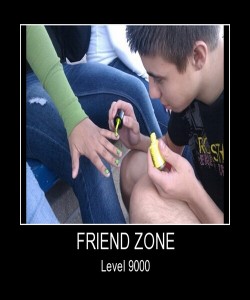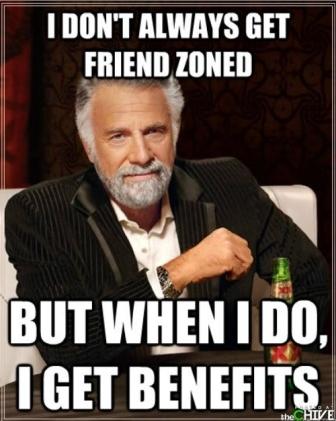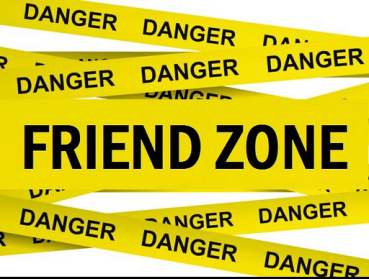The “friend zone” refers to a situation where there is a mismatch in romantic feelings between two individuals. For example, sometimes this is a sexual attraction mismatch, where one person is interested in romance while the other wants to “just be friends”. At other times, the friends are already sexually involved (i.e. friends-with-benefits), but there is a commitment mismatch, where only one person wants a “relationship” as a committed girlfriend or boyfriend.
Overall then, the friend zone occurs in relationships where both individuals’ emotional needs are not getting met. Someone is not getting what they want and need. Because all good relationships are built from a mutually-satisfying social exchange and trade (see here), friend zone situations ultimately don’t feel very good.
Therefore, when someone gets stuck in the friend zone, they have entered into an exchange that is not fair or equal. The other person is getting everything he/she wants…but the person stuck in the friend zone is not fully satisfied. In a nutshell, the friend zone person sold himself or herself short. They gave their “friend” everything, without making sure they got everything they wanted in return.
Why The Friend Zone Happens… and How to Avoid It!
By understanding the uneven exchange and mismatch above, you can often stop a friend zone situation from even happening in the first place. There are various ways to prevent such mismatching goals and make sure everyone is satisfied. Those include…
1) Being Attractive
In her book, Why We Love, Helen Fisher defines three types of love –Lust, Attraction, and Attachment (for more, see here). Similarly, pick-up artists speak about Attraction, Comfort, and Seduction (see here). Therefore, there are several components to creating love…not just one single feeling.
One of the reasons people end up being “just friends” is that they are simply not attractive to the other person they desire. They only create feelings of Attachment/Comfort around them (like a good friend), without any Attraction, Lust, or Seductive feelings. For any number of reasons then, the “friend zoned” individual just doesn’t spark the chemistry to make the other person desire them, lust after them, and want them in return. Therefore, the attraction is one-sided, with them receiving nothing in return.
Fortunately, people can learn to be more attractive physically (see here) and psychologically (see here). They can work to groom better, get nicer clothing, improve their body language, and get in better shape. They can also learn to develop social skills like approaching others with confidence (here), creating sexually stimulating conversations (here, and here), touching others (here), and being a bit coy, non-needy, and elusive (here). By working on “sex appeal”, individuals can be more likely to be put in the category of “lover” than “friend”.

2) Finding a Match
Individuals who end up in mutually-satisfying relationships often match each other on a number of levels. In other words, they are both roughly equal in traits such as physical attractiveness, or education, or social status. Although there are exceptions, people tend to attract and mate with others who are similar to themselves.
This “Matching Hypothesis” was first developed by Elaine Hatfield (Walster) and associates in 1966 – and later supported by a meta-analysis of studies by Feingold in 1988. Overall, studies show that individuals who end up romantically linked over time tend to match in their general level of desirable characteristics.
How does that relate to the “friend zone”? Well, sometimes a person is in the friend zone because they simply don’t “match” the individual who they are trying to be more-than-friends with. They are just too dissimilar to ever really have a mutually-satisfying and equal relationship. Essentially, they are trying for the wrong person…
This problem is easily remedied by picking potential lovers who are a better match – and more interested from the start. For that reason, a successful dater knows what he/she wants and what they are willing to give in return (see here and here). They also look out for signs of a good partner (here), while still staying realistic about it (here). Finally, successful daters learn body language – so they know who is interested in them back (here).
3) Being Bold and Asking
Another reason why people end up in the friend zone is that they are too afraid, uncertain, or passive. Many people approach someone they are attracted to as “just a friend” because it is easier and less emotionally-risky. In other situations, they may desire a committed relationship, but begin as a “hookup” or “friends-with-benefits” because that too is easier.
In any case, these individuals begin the interaction by not clearly communicating what they want – and settling for less. Sometimes, this is honestly done out of insecurity. Other times, it is a bit “sneaky”, usingfriendship to work their way in the “back door” – rather than simply facing rejection up front. No matter what the reason though, the process seldom works. Sure, there are exceptions of hookups turning into lovers, or “friends” blossoming into love, but those are rare – and usually involve some sort of mutual interest in dating to start.
Therefore, rather than getting stuck in the friend zone by being scared or devious, it is often more productive to state what is desired up front. It is better to make an even and honest trade. If the other person is not willing or interested, then it is better to simply walk away and find someone else who is. Deception doesn’t avoid the friend zone…neither does settling for less than is desired.
Besides, asking for a date outright can be pretty successful. Research by Hald and Høgh-Olesen (2010) found that 68% of single men and 43% of single women agreed to a date request by a stranger of average attractiveness. Therefore, with a little help, it is more easy and productive to simply ask for what you want up front (see here, here, and here). Learning ways to reduce shyness (here) and overcome fear of rejection (here) can help too!



4) Making Them Work
The final reason why people end up in the friend zone is because they are simply too nice (see here). They do all of the work. They make all of the concessions and sacrifices. They make it very “easy” for the other person to be with them.
In the process, they also tend to get taken for granted (here), devalued (here), and forgotten. Put simply, people value what they work to obtain and invest in. They have more attraction and respect for individuals for whom they perform favors (Jecker & Landy, 1969). They also find relationships more valuable and commit more fully, when they invest in them in various ways (Coleman, 2009).
Therefore, by doing all the work, an individual puts himself or herself “in” the friend zone. When they do all the investing…they develop all of the loving feelings. The other person does not.
Thus, to avoid the friend zone, effort and investment must be balanced on both sides. Each person must give and contribute in equal amounts. Both people’s needs must be satisfied at roughly equal measures. If the other person doesn’t offer…then ask! For more on making others work and invest, see here – as well as the original “friend zone” article here.
Conclusion
People end up getting stuck in the friend zone for a number of reasons. Sometimes they simply don’t make themselves attractive to others. Sometimes they pick the wrong person, who doesn’t match them as a lover. Sometimes they are not bold and do not demand a fair trade where their needs get met upfront. Other times, they do too much and don’t allow the other person to invest and fall in love too.
Fortunately, with a bit of work, all of those situations can be changed. The friend zone can be avoided. All it takes is a little personal development to be more attractive, finding better partners who “fit”, being a bit more assertive about what you need, and/or motivating others to give back and invest in you too. It may seem daunting at first – but you are worth it. You deserve to have what you want – so don’t settle for a “friend zone” situation that makes you miserable. Find someone who will be good enough to give you what you need too!



Leave a Reply